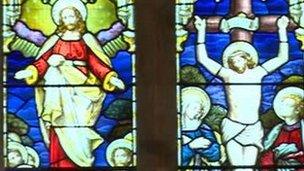Women bishops on agenda for Church in Wales governing body
- Published

A vote on women bishops was lost by three votes in 2008
The ordination of women priests as bishops is back on the agenda at a two-day meeting of the Church in Wales' governing body, five years after a move was narrowly defeated.
A vote on ordination in Wales was lost in 2008 by just three votes.
But the issue resurfaced last year when the Bench of Bishops drew up a discussion paper, external confirming their unanimous support for women bishops.
The Church aims to draft a new bill to be put to a vote in September.
However, even if the bill is backed, the Church says it would not be brought into force until pastoral provision had been put in place for those opposed to women bishops.
"It is now five years since the last time the governing body considered the question of the ordination of women to the episcopate, and many of its members will have changed," said the Bishop of St Asaph, the Right Reverend Gregory Cameron.
"The bishops feel it is important that the governing body has the opportunity to explore the theological questions behind these issues, and understand the conscientious reasons why those opposed to the ordination of women to the episcopate would not be able to accept the sacramental ministry of a woman bishop as well as the theological reasons why those in favour believe that the time is right for such as a step."
During the talks, the 144 members of the governing body will be put into seven groups, each headed by a bishop, to consider two papers - one outlining the case for the ordination of women and one setting out the case against.
In November 2012, the ordination of women bishops in the Church of England was narrowly rejected by its ruling general synod.
It led to calls for the Church in Wales to "have a go again".
Lord Harries of Pentregarth, a former Bishop of Oxford and leading theologian, said at the time: "I think it would be very interesting and salutary if the Church in Wales over the next year or two had women bishops and the Church of England didn't.
"It would be good to see the Church in Wales giving us a lead on this."
The Archdeacon of Cardigan, William Strange, and Rev Jenny Wigley gave their views
But speaking to BBC Radio Wales, Archdeacon of Cardigan, William Strange, said there remained obstacles and worries.
"We as a church would need to ask the traditionalists: What would they feel is the minimum safeguard requirement that they would have?" he said.
"I think that they would probably say that they need to have continuing access to male bishops who are also theologically sympathetic with them.
"It is not simply a misogynist anti-women thing. For them it is a matter of principle and of people who share their convictions."
The two-day meeting in Lampeter will be launched by the Archbishop of Wales Dr Barry Morgan who will deliver a keynote speech as president of the Church's governing body.
Over the course of the two days there will be group discussions about the ongoing review of the Church's future.
There will also be a presentation about a project in Newport aimed at students and young adults who would not attend a traditional parish church.
And the Church's rural life advisers will deliver a report and a motion to offer its support for the farming industry and small isolated communities.
- Published21 November 2012
- Published21 November 2012
- Published21 November 2012
- Published18 April 2012
- Published20 July 2012